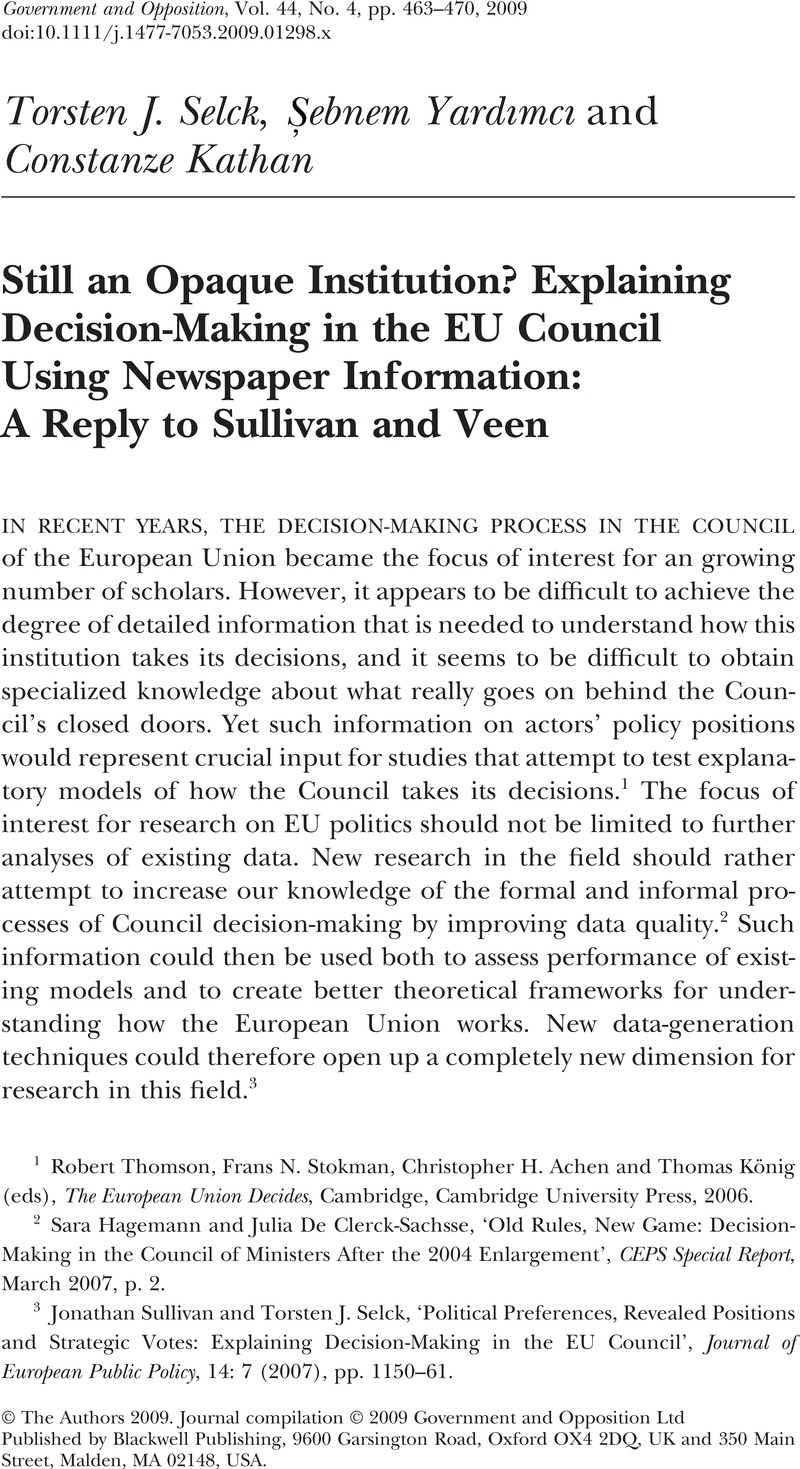Article contents
Still an Opaque Institution? Explaining Decision-Making in the EU Council Using Newspaper Information: A Reply to Sullivan and Veen
Published online by Cambridge University Press: 02 January 2013
Abstract

- Type
- Articles
- Information
- Copyright
- Copyright © The Author(s) 2009.
References
1 Robert Thomson, Frans N. Stokman, Christopher H. Achen and Thomas König (eds), The European Union Decides, Cambridge, Cambridge University Press, 2006.Google Scholar
2 Sara Hagemann and Julia De Clerck-Sachsse, ‘Old Rules, New Game: Decision-Making in the Council of Ministers After the 2004 Enlargement’, CEPS Special Report, March 2007, p. 2.Google Scholar
3 Sullivan, Jonathan and Selck, Torsten J., ‘Political Preferences, Revealed Positions and Strategic Votes: Explaining Decision-Making in the EU Council’, Journal of European Public Policy, 14: 7 (2007), pp. 1150–61.CrossRefGoogle Scholar
4 Sullivan, Jonathan and Veen, Tim, ‘The EU Council: Shedding Light on an Opaque Institution’, Government and Opposition, 44: 1 (2009), pp. 113–23.CrossRefGoogle Scholar
5 Ibid.Google Scholar
6 Ibid, p. 118.Google Scholar
7 See e.g. Semetko, Holli A., Van Der Brug, Wouter and Valkenburg, Patti M., ‘The Influence of Political Events on Attitudes Towards the European Union’, British Journal of Political Science, 33: 4 (2003), pp. 621–34;CrossRefGoogle Scholar and Hans-Jörg Trenz, ‘Media Coverage of European Governance; Exploring the European Public Sphere in National Quality Newspapers’, European Journal of Communication, 19: 3 (2004), pp. 291–319.
8 Jan Kleinnijenhuis and Paul Pennings, ‘Measurement of Party Positions on the Basis of Party Programmes, Media Coverage and Voter Perceptions’, in Michael Laver (ed.), Estimating the Policy Position of Political Actors, London, Routledge, 2001, pp. 162–82.Google Scholar
9 Hörl, Björn, Warntjern, Andreas and Wonka, Arndt, ‘Built on Quick Sand? A Decade of Procedural Spatial Models on EU Legislative Decision-Making’, Journal of European Public Policy, 12: 3 (2005), p. 593.CrossRefGoogle Scholar
10 Sullivan and Selck, ‘Political Preferences’, p. 1151.Google Scholar
11 See Regulation (EC) No. 1049/2001.Google Scholar
13 Hagemann, Sara, ‘Applying Ideal Point Estimation Methods to the Council of Ministers’, European Union Politics, 8: 2 (2007), pp. 282–3.CrossRefGoogle Scholar
14 Sullivan and Veen, ‘The EU Council’, p. 119.Google Scholar
15 König, Thomas, Luetgert, Brooke and Dannwolf, Tanja, ‘Quantifying European Legislative Research: Using CELEX and PreLex in EU Legislative Studies’, European Union Politics, 7: 4 (2006), p. 554.CrossRefGoogle Scholar
16 Note that ‘non-political’ does not mean that these are unbiased. We merely use the term here to differentiate newspaper reporting from political text such as party manifestos and political speeches.Google Scholar
17 David R. Mayhew, Divided We Govern: Party Control, Law-Making and Investigations 1946–1990, New Haven, CT, Yale University Press, 1991, p. 37.Google Scholar
18 Ibid.Google Scholar
19 Ibid.Google Scholar
20 Matthew Gentzhow and Jesse M. Shapiro, ‘What Drives Media Slant? Evidence from U.S. Daily Newspapers’, 13 November 2006, at SSRN: http://ssrn.com/abstract=947640, p. 5.Google Scholar
21 Sendhil Mullainathan and Andrei Shleifer, ‘The Market for News’, 30 December 2003, at SSRN: http://ssrn.com/abstract=485724.Google Scholar
25 ‘Informal Competitiveness Council: Services Directive Key Item at Graz Ministerial’, Europolitics, 21 April 2006.Google Scholar
- 3
- Cited by


